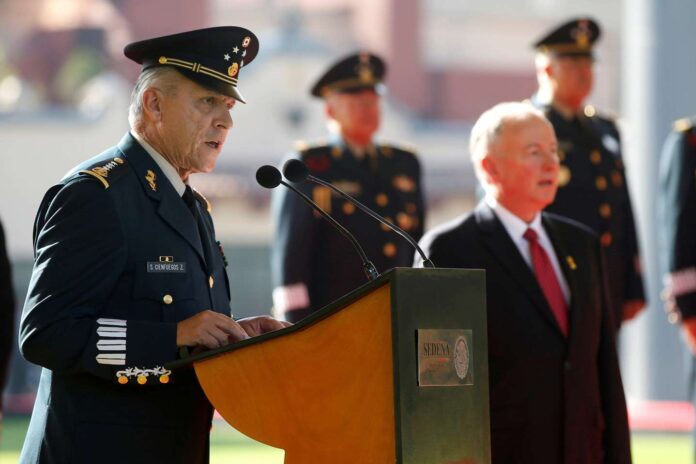A federal judge has granted the Justice Department’s request to drop criminal charges against Mexico’s former defense secretary, Gen. Salvador Cienfuegos Zepeda, who had been accused of helping one of Mexico’s drug cartels “operate with impunity” while using the Mexican military to hurt its rivals.
Cienfuegos, who was defense secretary under President Enrique Peña Nieto from 2012 to 2018, was taken into U.S. custody in October at Los Angeles International Airport.
In a joint statement on Tuesday, Attorney General William Barr and Mexican Attorney General Alejandro Gertz Manero said the U.S. wanted to drop the charges so Cienfuegos “may be investigated and, if appropriate, charged, under Mexican law.”
“The U.S. Department of Justice … has provided Mexico evidence in this case and commits to continued cooperation, within that framework, to support the investigation by Mexican authorities,” the statement said.

In granting the Justice Department’s motion to dismiss on Wednesday morning, Judge Carol Bagley said, “While the old adage, a bird in the hand comes in mind … I have no reason to doubt the Government.”
Cienfuegos will now be taken by U.S. marshals back to Mexico. At that point the Mexican government has promised to investigate but has not promised to charge him.
Federal prosecutors in Brooklyn, New York, had charged Cienfuegos, 72, with accepting bribes from the H-2 cartel, based in Nayarit and Sinaloa, Mexico, in exchange for his services while he was defense secretary. He faced life in prison if convicted on all counts.
In court documents from the Cienfuegos case, prosecutors in the Eastern District of New York described the H-2 cartel as having distributed thousands of pounds of heroin, cocaine, methamphetamines and marijuana.
“In Mexico,” an October filing said, “the H-2 Cartel trafficked in hundreds of lethal firearms and committed countless acts of horrific violence, including torture and murder, in order to protect against challenges from rival drug trafficking organizations, fight for territory and silence those who would cooperate with law enforcement.”
Cienfuegos’ detention memo says the Drug Enforcement Administration intercepted thousands of BlackBerry Messenger messages that prove that he helped make sure that military operations weren’t conducted against the H-2 cartel. Prosecutors alleged that he initiated military operations against rival drug cartels, helped find maritime transportation for H-2’s drugs and acted to expand H-2’s territory to Mazatlán and later the rest of Sinaloa.
Prosecutors also alleged that Cienfuegos introduced the cartel’s senior leadership to other corrupt Mexican officials, who they alleged took bribes and warned H-2 about U.S. law enforcement investigations, including the use of witnesses and informants. One supposed informant was alleged to have been killed because H-2 believed he was working with U.S. law enforcement, even though prosecutors say he wasn’t.
Earlier this year, Barr said, “One of our highest priorities must remain destroying the Mexican cartels. … [T]heir trafficking is largely responsible for the deaths, as we all know now, of 70,000 Americans a year.”
In his joint statement Tuesday with the Mexican attorney general, Barr said: “Our two countries remain committed to cooperation on this matter, as well as all our bilateral law enforcement cooperation. As the decision today reflects, we are stronger when we work together and respect the sovereignty of our nations and their institutions. This close partnership increases the security of the citizens of both our countries.”
Soururce: NBC News

